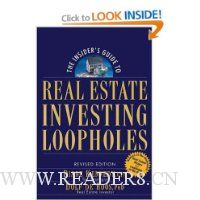
基本信息出版社:John Wiley & Sons
页码:240 页
出版日期:2005年03月
ISBN:0471711799
条形码:9780471711797
装帧:平装
正文语种:英语
外文书名:不动产投资漏洞内部指南
内容简介 在线阅读本书
Increase Your Profits and Lower Your Tax Bill with Tax Loopholes for Every Investor
The Insider′s Guide to Real Estate Investing Loopholes reveals all the best and most effective tax loopholes that successful real estate investors use to maximize their profits. Completely updated with over fifty percent new material, this Revised Edition also covers all the new tax laws, and features new and updated case studies and examples.
Real estate is probably the best investment money can buy, in part because there are so many profit–maximizing tax loopholes that directly benefit real estate investors. In this practical and straightforward real estate classic, bestselling authors Kennedy and de Roos show investors how to increase their investment profits and use real estate as a legal tax shelter. Inside, you′ll find practical guidance and trustworthy advice on:
∗ Tax loopholes that turn your home into a profit center
∗ Tricks for using your vacation home as a tax–savings investment
∗ Real estate investment strategies for taking advantage of international tax laws
∗ Creative cash flow techniques for increasing your investment′s profitability
∗ How to cut taxes through the 1031 tax–free exchange, pension funds, real estate loss deductions, homestead exemptions, and joint tenancies
∗ Real estate pitfalls and how to avoid them
∗ And much more
作者简介 Although born in New Zealand, Dolf de Roos started kindergarten in Europe, and went on to attend school in a variety of countries. This early introduction to travel no doubt contributed to his present propensity to move around. Today, speaking six languages and holding business interests in a number of regions, he considers himself a citizen of the world.
Dolf began investing in property as an undergraduate student. Over the years, as his successes with property became apparent, Dolf was cajoled into sharing the "why" and "how" of his real estate investment strategies. He has run public seminars throughout Australia, New Zealand, Asia, North America, and Europe, trained real estate agents, written and published seven best-selling property books including the Wall Street Jounal and New York Times Best Seller, Real Estate Riches, as well as introduced software to both analyze and manage investment property. Consequently, his views on property are esteemed, and he is often asked to address investors' conferences, appear on radio shows, and take part in television debates.
People who are familiar with Dolf know him as being passionate about the psychology of wealth in general, real estate in particular, and more than willing to share the fruits of his ongoing quest for knowledge.
编辑推荐 Review
"The Insider's Guide to Real Estate Investing Loopholes," is packed with tips on maximizing your wealth by utilizing tax and legal loopholes. The authors' basic premise is that wealthy real-estate investors exploit tax loopholes, but so can you. For instance, the authors break down the status of being a real-estate dealer, developer or investor, and offer advice on forming a company versus a LLC. At the end of each chapter, Q & A's help readers determine how best to manage their money and property. Be warned, though: light reading this isn't. This book is packed with technical jargon, and it will appeal only to those serious about complex tax and legal issues. (The New York Post, March 19, 2005)
"The Insider's Guide to Real Estate Investing Loopholes," is packed with tips on maximizing your wealth by utilizing tax and legal loopholes.
The authors' basic premise is that wealthy real-estate investors exploit tax loopholes, but so can you.
For instance, the authors break down the status of being a real-estate dealer, developer or investor, and offer advice on forming a company versus a LLC.
At the end of each chapter, Q & A's help readers determine how best to manage their money and property. Be warned, though: light reading this isn't. This book is packed with technical jargon, and it will appeal only to those serious about complex tax and legal issues. (The New York Post, March 19, 2005)